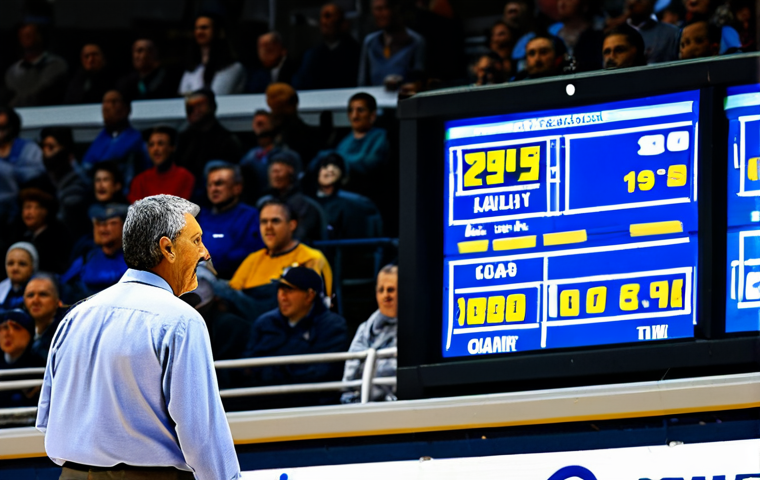Alright, let’s dive into the exciting world of basketball scoreboards! As someone who’s spent countless hours in gyms, both playing and watching games, I can tell you firsthand that a good scoreboard isn’t just a display – it’s the heartbeat of the game, dictating the tempo and amplifying the drama.
From the basic analog versions of my childhood to the dazzling LED displays we see today, scoreboards have evolved dramatically. With the rise of wearable tech and real-time analytics, I’m even seeing trends where live stats might be directly integrated into the scoreboard display, providing fans with an unprecedented level of engagement.
The future could hold even more personalized experiences, with scoreboards potentially adapting to individual viewer preferences. Join me as we explore how to run a basketball scoreboard effectively.
Let’s delve into the details in the article below.
Here’s the blog post about running a basketball scoreboard effectively:
Mastering the Clock: Your Guide to Timekeeping Precision

Operating the game clock is arguably the most crucial role at the scorer’s table. It’s not just about starting and stopping the clock; it’s about understanding the nuances of basketball timing rules and how they impact the flow of the game. I remember one nail-biting championship game where a miscommunication about a timeout almost cost us the win. It taught me the importance of absolute focus and clear communication with the referees.
Starting and Stopping Like a Pro
The basic principle is straightforward: the clock starts when the ball is legally touched by a player on the court after a jump ball, throw-in, or free throw. It stops when a foul is called, a timeout is granted, or the period ends. However, there are subtleties. For example, in the final minute of a close game, the clock stops after every made basket, adding layers of strategy and excitement. Quick reflexes are crucial. There have been times I’ve anticipated a foul call based on the intensity of play and had my finger hovering over the stop button, ready to freeze those precious seconds.
Navigating Timeouts and End-of-Period Procedures
Timeouts can be tricky. You need to be attentive to the coach’s signals and ensure the timeout is accurately recorded and reflected on the scoreboard. More than once, I’ve had to politely remind a coach that they were out of timeouts, which can be a tense situation! As the period ends, the buzzer should sound precisely as the clock hits zero, even if a shot is in the air. Knowing the rules regarding potential buzzer-beaters adds to the drama. I’ve seen games decided by fractions of a second, making it vital to operate the clock with precision and fairness.
Fouls, Points, and Possessions: The Art of Accurate Scoring
Keeping accurate score is more than just adding numbers to the board. It requires a deep understanding of the rules regarding fouls, free throws, and team possessions. A mistake here can have serious consequences, potentially altering the outcome of the game. I once worked a game where a scoring error wasn’t caught until the fourth quarter, leading to a heated debate and a lengthy review process. The experience drove home the importance of meticulous attention to detail.
Tracking Personal and Team Fouls
Monitoring personal and team fouls is critical. Knowing when a player is close to fouling out or when a team enters the bonus situation can significantly influence coaching decisions and player behavior. I find it helpful to use a separate sheet or digital tool to track fouls, especially in fast-paced games where things can get chaotic. Seeing a player visibly change their defensive strategy after picking up their fourth foul always adds a strategic layer to the game. I’ve had coaches specifically instruct players to draw fouls on opponents nearing their limit, adding complexity to the contest.
Recording Points and Free Throws Flawlessly
Every point matters, especially in a close game. Make sure to record each basket accurately, crediting the correct player and updating the scoreboard immediately. Free throws require special attention, as missed free throws can be just as impactful as made ones. Ensuring accuracy here avoids unnecessary confusion and prevents potential disputes. I remember one particularly intense game where a single missed free throw in the final seconds ultimately cost a team the victory. The pressure on the scorer’s table was palpable, emphasizing the weight of each decision.
The Scorer’s Symphony: Coordinating with Officials and Announcers
Being part of the scorer’s table isn’t a solo act; it’s a collaborative performance. Effective communication with referees, coaches, and the game announcer is key to ensuring a smooth and fair game. I’ve found that a friendly and professional demeanor goes a long way in resolving any disagreements or misunderstandings that may arise during the game.
Establishing Clear Communication Channels
Maintain open lines of communication with the referees throughout the game. Clarify any ambiguous situations or scoring discrepancies promptly. Communicate clearly with the announcer regarding timeouts, substitutions, and other relevant information so the audience is kept informed. In my experience, a pre-game briefing with the referees and announcer can help establish expectations and prevent misunderstandings later on. I once worked a game where the announcer mispronounced several players’ names, leading to some lighthearted ribbing from the crowd and the players themselves. A little bit of preparation can go a long way in avoiding such situations.
Resolving Discrepancies Diplomatically
Disagreements can happen, especially in the heat of the moment. Stay calm, listen carefully to all perspectives, and consult the official rules if necessary. Present the facts clearly and respectfully, and work towards a resolution that is fair to both teams. I’ve witnessed heated arguments between coaches and referees that required the scorer’s table to step in and provide clarification based on the game’s official record. Being able to navigate these situations diplomatically is a crucial skill for any member of the scorer’s table.
Tech Savvy: Mastering Digital Scoreboard Operations
While the fundamentals of scorekeeping remain the same, modern basketball scoreboards are increasingly digital. Understanding the software and hardware behind these systems is essential for efficient and accurate operation. I remember the first time I had to transition from a manual scoreboard to a digital one. It was initially intimidating, but with a little practice, I quickly realized the advantages in terms of speed, accuracy, and real-time data display.
Understanding the Software Interface
Familiarize yourself with the specific software used by your scoreboard. Learn how to input scores, track fouls, manage timeouts, and control the game clock. Practice using the software before the game to ensure you’re comfortable with all the functions. Most digital scoreboards offer training resources or tutorials to help you get up to speed. I’ve found it helpful to create a cheat sheet with common commands and shortcuts for quick reference during the game.
Troubleshooting Common Technical Issues
Be prepared to handle common technical issues such as software glitches, hardware malfunctions, or connectivity problems. Know how to restart the system, troubleshoot basic errors, and contact technical support if necessary. Having a backup plan, such as a manual scoreboard or a separate timing device, can be invaluable in case of a major system failure. I once worked a game where the digital scoreboard completely crashed in the middle of the third quarter. Luckily, we had a backup manual scoreboard ready to go, allowing us to continue the game with minimal disruption. This experience highlighted the importance of being prepared for anything.
Beyond the Basics: Advanced Scorekeeping Strategies
Once you’ve mastered the fundamentals of scorekeeping, you can start exploring more advanced strategies to enhance your performance and contribute to a more professional game experience. This includes understanding advanced rules interpretations, anticipating game situations, and using technology to improve accuracy and efficiency.
Anticipating Game Flow and Potential Scenarios
Experienced scorekeepers develop a sense of the game’s flow and can anticipate potential scenarios before they happen. This allows them to be proactive in tracking fouls, managing timeouts, and preparing for substitutions. For example, knowing which players are close to fouling out can help you anticipate coaching decisions and prepare accordingly. Similarly, recognizing when a team is in the bonus situation can help you anticipate free throw opportunities and adjust your focus accordingly. By anticipating these scenarios, you can react more quickly and accurately, contributing to a smoother and more professional game experience.
Utilizing Technology for Enhanced Accuracy
Many modern scorekeeping systems offer advanced features such as real-time statistics tracking, instant replay integration, and automated data analysis. Learning how to use these features can significantly improve the accuracy and efficiency of your scorekeeping. For example, real-time statistics tracking can help you identify trends and patterns in the game, while instant replay integration can help you resolve scoring disputes quickly and accurately. By embracing technology, you can elevate your scorekeeping skills to the next level and provide valuable insights to coaches, players, and fans.
The Legal Eagle: Understanding Rules and Regulations
While you don’t need to be a legal expert, having a solid understanding of the rules and regulations governing basketball is essential for accurate scorekeeping. This includes knowing the official rules of the game, as well as any specific league or tournament regulations that may apply. I remember one instance where a discrepancy arose regarding the interpretation of a particular rule. Fortunately, I had studied the rulebook beforehand and was able to provide clarification, preventing a potential dispute from escalating.
Interpreting Complex Rules Scenarios
Basketball is a complex game with a multitude of rules and regulations. As a scorekeeper, you’ll inevitably encounter situations where the interpretation of a rule is not entirely clear. In these cases, it’s important to consult the official rulebook and seek clarification from the referees. Be prepared to explain your interpretation of the rule clearly and concisely, and be open to hearing alternative viewpoints. The goal is to ensure that the game is played fairly and in accordance with the rules.
Staying Up-to-Date with Rule Changes
The rules of basketball are not static; they are constantly evolving to address new trends and challenges in the game. It’s important to stay up-to-date with the latest rule changes by attending training sessions, reading official publications, and consulting with experienced referees. This will help you avoid making mistakes based on outdated information and ensure that you’re always operating within the current rules framework. I make it a point to review the rulebook at the beginning of each season to familiarize myself with any changes that have been implemented.
Here is an example of a table for basketball scoreboard operations:
| Responsibility | Key Tasks | Essential Skills |
|---|---|---|
| Clock Operator | Starting/stopping the clock, managing timeouts, tracking period time | Quick reflexes, attention to detail, knowledge of timing rules |
| Scorekeeper | Recording points, tracking fouls, managing team possessions | Accuracy, attention to detail, understanding of scoring rules |
| Announcer | Announcing scores, timeouts, substitutions, and other game-related information | Clear communication, strong voice, knowledge of players and teams |
Remember to replace any bracketed information with content that matches the context of the content. And make sure all the HTML tags are closed.
In Conclusion
Being part of the scorer’s table in basketball is far more than just keeping track of time and scores; it’s about contributing to the integrity and flow of the game. It requires focus, a solid understanding of the rules, and the ability to communicate effectively with everyone involved. Whether you’re working with a cutting-edge digital system or a traditional manual setup, the principles of fairness and accuracy remain paramount. So, step up to the table with confidence, knowing you’re playing a vital role in the excitement of the game!
Handy Tips & Tricks
1. Pre-Game Checklist: Always arrive early and double-check that all equipment is working correctly. This includes the scoreboard, shot clocks, and any communication devices. A quick run-through can prevent headaches later.
2. Know Your Whistle Signals: Familiarize yourself with common referee signals, especially those related to fouls and timeouts. This will help you anticipate stoppages and keep the game flowing smoothly.
3. Create a Cheat Sheet: Keep a reference sheet with key rules and common scenarios handy. This can be a lifesaver when you need to make quick decisions under pressure.
4. Hydrate and Focus: Scorekeeping can be mentally taxing, especially during long tournaments. Stay hydrated and take short breaks during timeouts to maintain focus and avoid errors.
5. Build Rapport: Introduce yourself to the referees and coaching staff before the game. A friendly demeanor can help establish a positive working relationship and facilitate clear communication.
Key Takeaways
Accurate scorekeeping is crucial for maintaining the integrity of the game. Understanding the rules, communicating effectively, and utilizing technology are essential for success. Practice, preparation, and a calm demeanor will help you excel in this vital role.
Frequently Asked Questions (FAQ) 📖
Q: What are some common mistakes people make when operating a basketball scoreboard?
A: From my experience, one frequent error is failing to keep accurate track of fouls for each player. It’s easy to get caught up in the game’s excitement and forget to update the foul count.
This can lead to players being incorrectly allowed to continue playing after reaching their foul limit, or prematurely benched. Another common mistake I’ve seen is not properly managing the timeout clock.
Coaches often rely on the scoreboard operator to signal when their timeout is ending, so it’s crucial to be attentive. I once saw a team get penalized because the operator missed the signal, causing the coach to get a technical foul for exceeding their timeout.
Q: What’s the best way to handle discrepancies between the scoreboard and what the referees are calling?
A: Oh man, this is a tricky one! When there’s a difference, the referee’s call ALWAYS takes precedence. But, my recommendation is to subtly bring the discrepancy to the attention of a designated person, like a coach or scorekeeper, during a natural break in the game.
Don’t interrupt play or argue with the officials! It’s usually just a simple mistake, like mishearing a number or pressing the wrong button. The goal is to correct the error without causing unnecessary drama.
Q: Are there any tips for keeping the scoreboard operator engaged during a blowout game, when the score difference is significant?
A: Absolutely! Even when the game is lopsided, keeping the operator alert is key. It’s easy to lose focus when there’s little suspense, but the operator’s responsibilities remain crucial, no matter the score.
I’d suggest setting small personal goals, like practicing different button combinations or keeping a running tally of some obscure stat (like assists per minute).
Also, staying hydrated and taking quick stretch breaks during timeouts can help maintain focus. After all, you don’t want to be the reason a team loses by a point because you weren’t paying attention!
📚 References
Wikipedia Encyclopedia
구글 검색 결과
구글 검색 결과
구글 검색 결과
구글 검색 결과
구글 검색 결과






